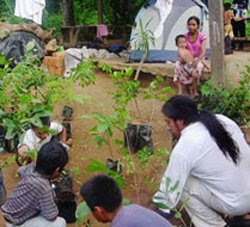The Indigenous Permaculture Certificate Training will now be held in June and July, to better accommodate the schedules of youth and college students
The Training is 80 hours of class and field work and includes practices in the field. Course materials will be provided and lunches are potluck. We particularly encourage native peoples, lower-income community members, and youth aged 15-18 to participate. We expect to accommodate 12-18 people.

The first week will be held in June or July in the SF Bay Area, primarily Oakland, San Francisco, and Berkeley, and a July weekend up in the Hoopa Valley/Trinity RiverWatershed. More details are at our website.
http://indigenous-permaculture.com/calendar.html
To receive certification, participants must attend all class meetings and participate in a final group project. Participants must be prepared to do between three to six hours of work outside of class each week. The final project is a two year commitment implementing aspects of Indigenous Permaculture within the community, and a group presentation at the end of the course.
Please contact us by April 15 to register your interest, and ensure we notify you as we firm up the dates.
ipp@ecologycenter.org
(415) 370-1657
www.Indigenous-Permaculture.com
The Indigenous Permaculture Program is a grassroots organization that supports community food security to revitalize ecological health.
OUR MISSION
- Revitalize Native and local communities through indigenous science, land stewardship, sustainable agriculture, community food security, and sustainable development.
- Promote awareness of human impacts on the natural environment and on Indigenous communities when unsustainable choices are made
- Use locally-available resources and demonstrate the power of conscious choices to create self-sufficient communities that care for and preserve Mother Earth
We share traditional farming practices and apply environmentally and culturally-appropriate technology, with the ultimate goal of community food security, and do this work in an affordable way that builds capacity within the community. We provide holistic support to design and implement community food security projects, inspired by indigenous peoples' understanding of how to live in place.
Related Indigenous People's Issues by Keywords
Use the Search Function at the Top to Find More Articles, Fellowships, Conferences, Indigenous Issues, Book Reviews, and Resources
Contribute to Indigenous People's Issues Today
Do you have a resource on indigenous peoples that you would like to share? Indigenous People's Issues is always looking for great new information, news, articles, book reviews, movies, stories, or resources.
Please send it along and we will do a feature. Email it to the Editor, Peter N. Jones: pnj "at" bauuinstitute.com.
Privacy Policy for Indigenous Peoples Issues Today (http://indigenousissuestoday.blogspot.com)
The privacy of our visitors to Indigenous Peoples Issues Today is important to us.
At Indigenous Peoples Issues Today, we recognize that privacy of your personal information is important. Here is information on what types of personal information we receive and collect when you use visit Indigenous Peoples Issues Today, and how we safeguard your information. We never sell your personal information to third parties.
Log Files
As with most other websites, we collect and use the data contained in log files. The information in the log files include your IP (internet protocol) address, your ISP (internet service provider, such as AOL or Shaw Cable), the browser you used to visit our site (such as Internet Explorer or Firefox), the time you visited our site and which pages you visited throughout our site.
Cookies and Web Beacons
We do use cookies to store information, such as your personal preferences when you visit our site. This could include only showing you a pop-up once in your visit, or the ability to login to some of our features, such as forums.
We also use third party advertisements on Indigenous Peoples Issues Today to support our site. Some of these advertisers may use technology such as cookies and web beacons when they advertise on our site, which will also send these advertisers (such as Google through the Google AdSense program) information including your IP address, your ISP, the browser you used to visit our site, and in some cases, whether you have Flash installed. This is generally used for geotargeting purposes (showing New York real estate ads to someone in New York, for example) or showing certain ads based on specific sites visited (such as showing cooking ads to someone who frequents cooking sites). Google, as a third party vendor, uses cookies to serve ads on this site. Google's use of the DART cookie enables it to serve ads to users based on their visit to sites on the Internet. Users may opt out of the use of the DART cookie by visiting the Google ad and content network privacy policy.
You can chose to disable or selectively turn off our cookies or third-party cookies in your browser settings, or by managing preferences in programs such as Norton Internet Security. However, this can affect how you are able to interact with our site as well as other websites. This could include the inability to login to services or programs, such as logging into forums or accounts.
Thank you for understanding and supporting Indigenous Peoples Issues Today. We understand that some viewers may be concerned that ads are sometimes served for companies that negatively depict indigenous peoples and their cultures. We understand this concern. However, there are many legitimate companies that utilize Google Adwords and other programs to attract visitors. Currently, we have no way of deciphering between the two - we leave it up to the viewer to decide whether the companies serving ads are honest or not.



No comments:
Post a Comment